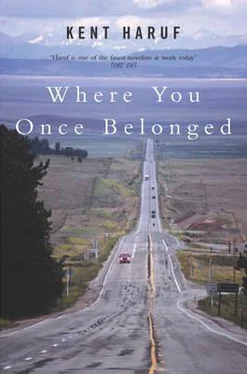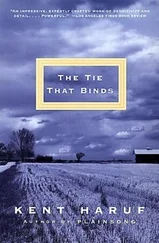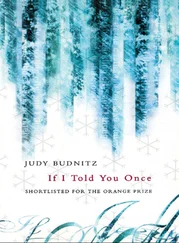Kent Haruf - Where You Once Belonged
Здесь есть возможность читать онлайн «Kent Haruf - Where You Once Belonged» весь текст электронной книги совершенно бесплатно (целиком полную версию без сокращений). В некоторых случаях можно слушать аудио, скачать через торрент в формате fb2 и присутствует краткое содержание. Год выпуска: 2004, Издательство: Pan MacMillan, Жанр: Современная проза, на английском языке. Описание произведения, (предисловие) а так же отзывы посетителей доступны на портале библиотеки ЛибКат.
- Название:Where You Once Belonged
- Автор:
- Издательство:Pan MacMillan
- Жанр:
- Год:2004
- ISBN:нет данных
- Рейтинг книги:5 / 5. Голосов: 1
-
Избранное:Добавить в избранное
- Отзывы:
-
Ваша оценка:
- 100
- 1
- 2
- 3
- 4
- 5
Where You Once Belonged: краткое содержание, описание и аннотация
Предлагаем к чтению аннотацию, описание, краткое содержание или предисловие (зависит от того, что написал сам автор книги «Where You Once Belonged»). Если вы не нашли необходимую информацию о книге — напишите в комментариях, мы постараемся отыскать её.
Where You Once Belonged — читать онлайн бесплатно полную книгу (весь текст) целиком
Ниже представлен текст книги, разбитый по страницам. Система сохранения места последней прочитанной страницы, позволяет с удобством читать онлайн бесплатно книгу «Where You Once Belonged», без необходимости каждый раз заново искать на чём Вы остановились. Поставьте закладку, и сможете в любой момент перейти на страницу, на которой закончили чтение.
Интервал:
Закладка:
“This young woman thinks we will publish this in the paper.”
“What is it?”
“Here,” she said. “You read it. I refuse to.” She handed the tablet paper to me.
“Thank you, Mrs. Walsh,” I said. “Maybe you can begin closing up now.”
She turned and sat down at her desk. I could hear her behind me. She was upset. She had begun to whisper in the direction of Betty Lucas.
I read what was on the paper. It was a brief notice. It had been written in pencil and the paper it had been written on had been folded many times, into small squares, and at the edges it was frayed and ragged as though she had been carrying it around in her pocket for a week waiting for the right moment to bring it in. Then I looked at Jessie. Her eyes were very brown and her cheeks were still red from having been outside in the cold. I thought she looked very beautiful. There were bits of dry snow on the shoulders of her blue coat.
“Yes,” I said. “I’ve heard your husband was gone. I suppose we’ve all heard that much. But I take it you haven’t heard from him yet either. Is that what this is about?”
“No. I haven’t heard from him.”
“Where do you think he is?”
“I don’t know. I haven’t any idea where Jack Burdette is.”
“You’ve notified the police, though?”
“Yes. But yesterday there was a bill in the mail.”
“A bill?”
“For some clothes he charged,” Jessie said. “So I called them back and told them they could stop looking for him. He isn’t lost.”
“I see,” I said. “I think I do, anyway.” Because it seemed obvious to me now, having read what she’d written on the piece of tablet paper, that she had come to a thorough understanding about the charges Burdette had made on Main Street and also about what those charges indicated about his disappearance. She hadn’t had to be present for the jokes and the talk in the bakery, or later to be there to hear the growing alarm people felt. She seemed to understand all too well what those things would mean to her as his wife in Holt.
I looked outside for a moment. On Main Street it was fully dark now. The streetlights had come on and it was snowing again. Behind me Mrs. Walsh and Betty Lucas had begun to put their coats on, preparing to go home for the evening. I waited until they had gone out through the back room into the alley. Then I turned back to Jessie.
“I wonder, Mrs. Burdette,” I said, “I wonder if you don’t think this is a little bit drastic? After all he might come back. Don’t you think? Maybe he’s just taking a vacation.”
“No,” she said. “I don’t think that. I’ve stopped thinking that. It’s been two weeks.”
“Yes. But two weeks aren’t a lifetime.”
“They’re long enough.”
“And so you still want me to print this in the paper? You do want that?”
She began to open her purse. “How much is it?”
“But wait a minute,” I said. “I haven’t said I will yet.”
She looked at me. Her eyes were very large and dark. I picked up the penciled notice once more, reading it again while she turned to see that the two little boys were still seated quietly on the chair behind her. They were watching her like little birds.
Finally I said: “Very well, then. I’ll agree to print this. Although I don’t think it will do you any good. In fact I’m afraid it will do you a great deal of harm in town.”
She still wanted it printed. So I took out a form from a shelf under the counter. I copied her note onto the form as she had written it and afterward she paid for it.
She began to prepare TJ and Bobby to go outside again. They sat solemnly in front of her while she knelt to zip up their snowsuits; she helped them pull their mittens on.
I was standing behind the counter, watching her. Her blue coat was smooth and neat across the hips and her hair looked dark and lovely. “Listen,” I said, “will you let me drive you and your boys home? I’m leaving now anyway.”
She looked out the front window. Outside it was worse: it was snowing harder and the wind was blowing the snow horizontally along the street. “If it’s not any trouble,” she said. “I don’t want them to get cold again.”
“I’ll get my coat.”
Thus she allowed me to drive them across town to Gum Street that first time because it was snowing and because it was cold outside. I don’t recall that we said anything of significance. TJ sat on the seat between us and she had Bobby on her lap and I suppose during the six- or seven-block ride one of us managed to say something about the accumulation of snow. It was a quiet and awkward ride. But at the curb when I stopped to let them out I remember watching her take the boys up the sidewalk into their small house in the snow and I recall how she looked in her blue coat when she opened the door and then how the house itself looked after she had turned the lights on. Afterward I drove home again to the house where Nora and Toni were waiting for me to eat supper with them. But I wasn’t very much interested in supper just then, nor in going home again, nor even in my wife and daughter. I suppose by that time I was already a little in love with Jessie Burdette.
So in the following week I ran her notice as a kind of display ad on the back page of the Holt Mercury just as she had wanted it. I offset it with the announcements for Sunday church services and the obituaries for two longtime Holt County residents. Her notice said: I’m not responsible for whatever Jack Burdette did or will do. He’s no good. It doesn’t matter what people say. He’s a son of a bitch and I don’t care anymore .
I had my own reasons for printing it.
This public declaration of hers caused a stir in town when people read it. My father, for one, called me on the phone and said I was crazy to print such a thing. What did I think I was doing? It was unprofessional, he said; it was bad business practice. This was Holt County, Colorado, not San Francisco, California. Did I think he’d turned the paper over to have it ruined?
Of course other people in town felt similarly, as I knew they would, although their annoyance and their objections had more to do with moral considerations than with any concern over practical issues. Some of the older women were particularly incensed: they wrote letters to the editor about the appearance of profanity in the Holt Mercury . They didn’t like it, not the profanity nor the public display of raw emotion, and a number of the women canceled their subscriptions as a result.
Nonetheless, the commotion Jessie’s notice caused in Holt County that week was soon forgotten. It was a minor episode compared to what happened in the weeks and months that followed. And all of that got into the paper too.
Then there was one other small event which reflected on what was printed in the Mercury at about that time. It was in a minor key. It had to do with Jack Burdette’s mother.
She was an ancient woman now, gray-haired and very thin and even more severe than she had been before, but still living alone in the house on North Birch Street and still attending the Catholic church on Sunday mornings when she was able. After her son had been gone for about a month, in a kind of desperate form of masculine absurdity — since no woman would have even considered such a thing — several of the men in town decided that they would call on old Mrs. Burdette to ask her some questions. They thought it would be worthwhile to inquire if she had heard from her son. They hoped, if nothing else, that she might be able to suggest where he had gone.
So one afternoon they walked up onto the front porch and rang the doorbell. But after Mrs. Burdette had opened the door to them she didn’t ask them in. She merely waited inside, in the dark front hallway of the house, listening to their questions and foolish talk from beyond the scarcely-opened door. They continued to explain to her what they had come for. Then they stopped talking; she hadn’t said anything yet. She had simply stared at them out of those clean little wire-rimmed glasses while she studied one face and then another. She didn’t seem to know or even to care what they were talking about. In exasperation, one of the men said to her: “But, Mrs. Burdette, look here: you do know Jack’s gone, don’t you? You do read the local newspaper? Why, it’s been in the Mercury . Haven’t you seen it?”
Читать дальшеИнтервал:
Закладка:
Похожие книги на «Where You Once Belonged»
Представляем Вашему вниманию похожие книги на «Where You Once Belonged» списком для выбора. Мы отобрали схожую по названию и смыслу литературу в надежде предоставить читателям больше вариантов отыскать новые, интересные, ещё непрочитанные произведения.
Обсуждение, отзывы о книге «Where You Once Belonged» и просто собственные мнения читателей. Оставьте ваши комментарии, напишите, что Вы думаете о произведении, его смысле или главных героях. Укажите что конкретно понравилось, а что нет, и почему Вы так считаете.












